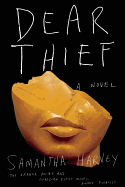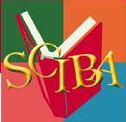 SCIBA president Maureen Palacios, from Once Upon a Time Bookstore in Montrose, Calif., kicked off the annual Southern California Independent Booksellers Association conference last Friday evening in Hollywood, at the Beverly Garland Hotel, by focusing on the many positive things happening for independent booksellers. "People are looking at the independent channel in a good way," she said. Last year's hugely successful California Bookstore Day, she noted, "exploded," and sparked the nationwide Independent Bookstore Day in the works for 2015. Representatives from the American Booksellers Association were on hand to provide resources and links for booksellers to make the most of the Indies First push on November 29, Small Business Saturday (which accounted for $5.7 billion in sales for small businesses last year). "It's really important for us to keep this momentum going," Palacios said.
SCIBA president Maureen Palacios, from Once Upon a Time Bookstore in Montrose, Calif., kicked off the annual Southern California Independent Booksellers Association conference last Friday evening in Hollywood, at the Beverly Garland Hotel, by focusing on the many positive things happening for independent booksellers. "People are looking at the independent channel in a good way," she said. Last year's hugely successful California Bookstore Day, she noted, "exploded," and sparked the nationwide Independent Bookstore Day in the works for 2015. Representatives from the American Booksellers Association were on hand to provide resources and links for booksellers to make the most of the Indies First push on November 29, Small Business Saturday (which accounted for $5.7 billion in sales for small businesses last year). "It's really important for us to keep this momentum going," Palacios said.
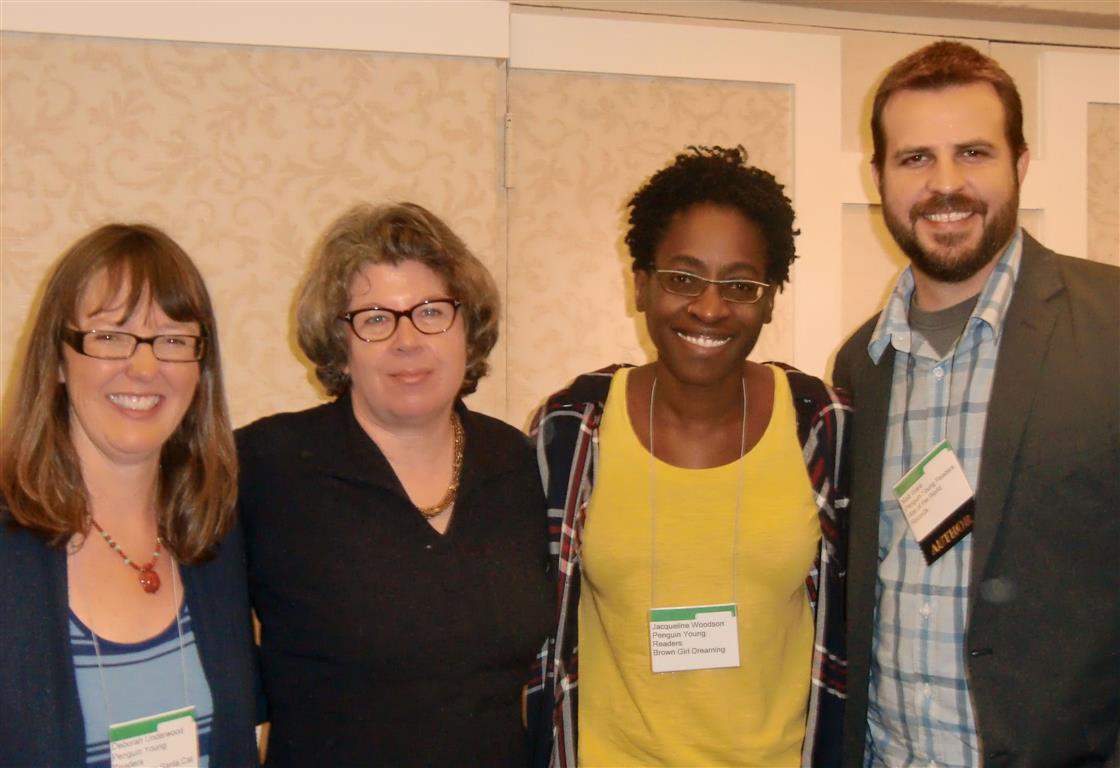 |
| SCIBA Children's Breakfast speakers (l.-r.): Deborah Underwood, Meg Wolitzer and Jacqueline Woodson, with emcee Matt Ward. |
One of the key ways independent booksellers distinguish themselves, Palacios pointed out at the children's author breakfast on Saturday, is by "discovering and promoting locally prepared literary offerings." Such offerings included books by the SCIBA children's award winners honored at the breakfast: picture book winner Salina Yoon, Found (Bloomsbury); middle grade winner Holly Goldberg Sloan, Counting by 7s (Puffin); and YA winner Catherine Linka, A Girl Called Fearless (St. Martin's).
Acting as emcee of the children's awards and breakfast, Matt Ward (War of the World Records, Penguin) noted that the morning brought together two of his favorite things: kid's books and breakfast meats. Then Deborah Underwood, author of Here Comes Santa Cat (Dial), shared, "just for the record," that when she was a street musician on San Francisco's Fisherman's Wharf, where local booksellers brought the performers warm drinks on cold nights, "no online bookseller ever came out to us with a coffeepot." Underwood told the booksellers that she's working on a Tooth Fairy Cat book and a Valentine Cat book.
Just days after her National Book Award nomination for Brown Girl Dreaming (Penguin), Jacqueline Woodson told the breakfast attendees that she knew she wanted to be a writer since she was seven years old and a bad liar. "My teacher said that if you like lying, then write it down," explained Woodson, "because then it's fiction." The author said she started writing Brown Girl Dreaming shortly after her mother died, as she wanted to find out who she was before she became her mother. But in working on the memoir, Woodson added, she also discovered that her "hot mess" of a father had a Civil War fighter on his branch of the family tree.
The final breakfast speaker, Meg Wolitzer, whose YA novel Belzhar (Dutton) is set in a boarding school for "emotionally fragile teenagers," said she saw her family as "the Jewish, bookish Kennedys" who happened to live off exit 43 of the Long Island Expressway. Wolitzer said every writer writes for some reader--whether literally or figuratively. In her early days, Wolitzer imagined dictating stories to a teacher, but also credits her mother (whose first Saturday Evening Post story was called "Today a Woman Went Mad at the Supermarket") with planting the writing seed.
The SCIBA adult book awards were the focus of the luncheon. William Bradley won the Glenn Goldman Award for art/architecture/photography for Los Angeles Station: Tracks to the Future (Angel City Press); Naomi Hirahara won the T. Jefferson Parker mystery award for Murder on Bamboo Lane (Berkley); Roy Choi won in nonfiction for L.A. Son: My Life, My City, My Food (Anthony Bourdain/Ecco); and Gabrielle Zevin took the fiction prize for The Storied Life of A.J. Fikry (Algonquin). Zevin charmed everyone by admitting she might have had an unfair advantage since her character is a bookseller.
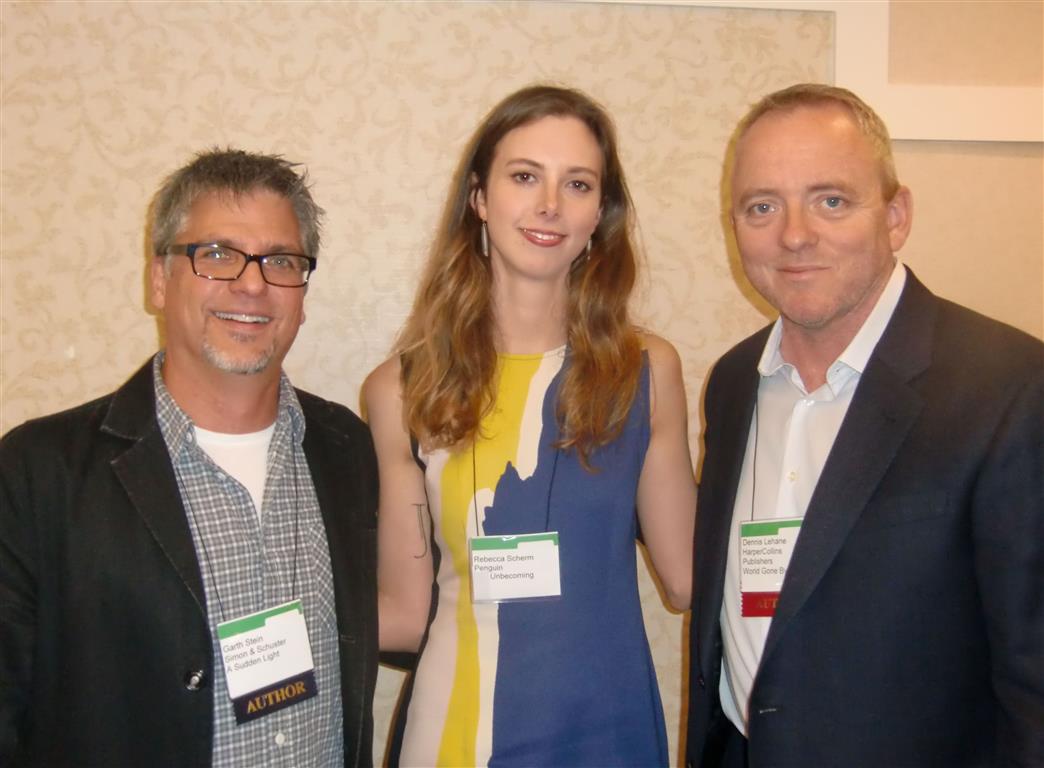 |
| Adult Lunch speakers (l.-r.): Garth Stein, Rebecca Scherm, Dennis Lehane. |
At the luncheon, Dennis Lehane (World Gone By, coming from Morrow in May) said he had 20 reasons for becoming a writer, the first 10 of which involved librarians and booksellers. Born into an Boston Irish immigrant family that had a "complete lack of respect for the truth," Lehane said he learned the "bloodsport" of storytelling while going to the neighborhood bar with his father. Lehane's two basic writing rules: hit the ground running and be funny. Humor is important, he said, because "the essential working-class story is a tragic story." Despite being surrounded by storytellers, Lehane said, reading fiction was not for his father, who slept through all three of the author's movies (Mystic River, Gone, Baby, Gone and Shutter Island). In his father's defense, Lehane added, he never examined his plumber brother's work, either.
When debut novelist Rebecca Scherm (Unbecoming, Viking, Jan.) took the podium, she admitted that this was her first talk as an author. Yet, she fit right in on the program with a presentation that showed her evolution from a Kentucky girl enamored with actress Grace Kelly to a novelist whos book upturns the Hitchcockian heroine v. femme fatale paradigm.
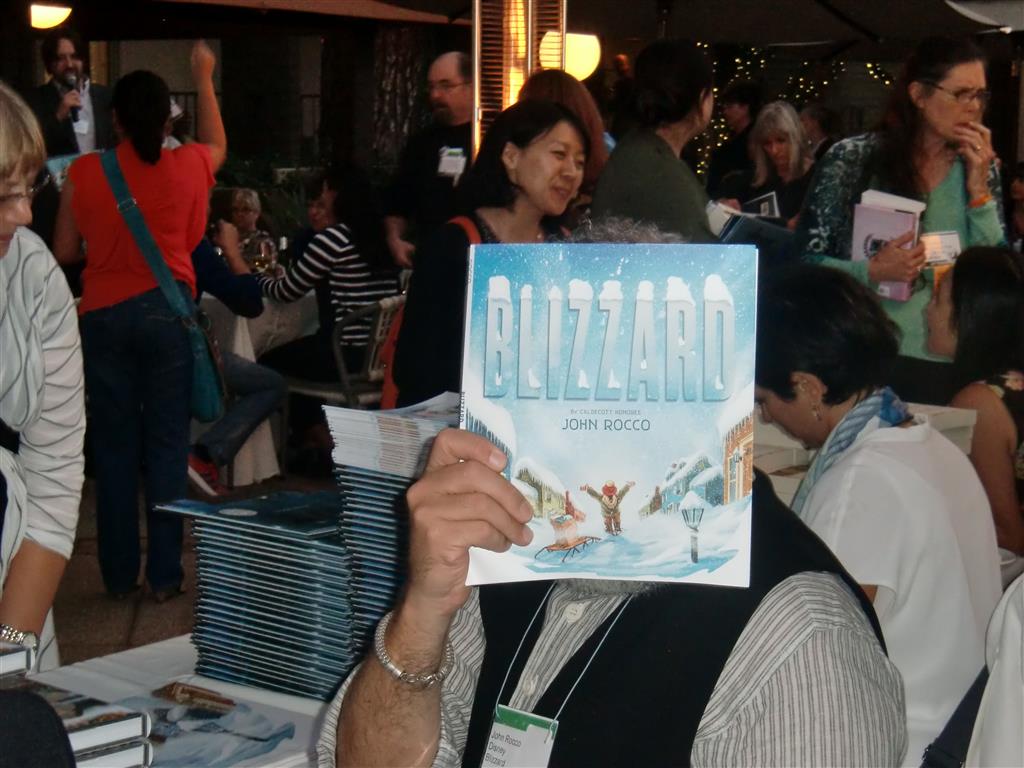 |
|
SCIBA did not hold its signature "Authors Feast" dinner, opting for a evening reception on the patio to give booksellers more face-to-face time with the more than 20 featured authors. John Rocco, Blizzard (Disney), shows his book face.
|
Indie bookstore favorite Garth Stein wrapped up the luncheon program by discussing A Sudden Light (Simon & Schuster), his multi-generational "spiritual ghost story" set in a fictional affluent community built at the turn of the 19th century on clear-cut lands outside Seattle--across the creek from the suburbs where Stein grew up. Stein originally wrote the story as a play, and revised it into a novel shortly his father died--which only deepened the tale's father-son elements. A central theme for the adolescent protagonist in A Sudden Light, Stein said, is the conflict between truth and loyalty, a theme on which he extrapolated as he pointed out that if the rule of law treats corporations as people, then we should hold them accountable to act as "ethical people" in all of their business negotiations. "What some corporations do not understand is that books are not widgets," he said. A book's raw materials of time and imagination, he said, "can't be replaced by anything else."
Stein's comments mirrored the weekend's overall theme of supporting irreplaceable independent bookstores. Happily, SCIBA executive director Andrea Vuleta said that the number of association member stores increased from 44 last year to 61. The 127 bookseller attendees at the show represented a 22% increase from last year, while the 20 librarians/teachers category showed an increase of 18%. --Bridget Kinsella













 SCIBA president Maureen Palacios, from Once Upon a Time Bookstore in Montrose, Calif., kicked off the annual Southern California Independent Booksellers Association conference last Friday evening in Hollywood, at the Beverly Garland Hotel, by focusing on the many positive things happening for independent booksellers. "People are looking at the independent channel in a good way," she said. Last year's hugely successful California Bookstore Day, she noted, "exploded," and sparked the nationwide Independent Bookstore Day in the works for 2015. Representatives from the American Booksellers Association were on hand to provide resources and links for booksellers to make the most of the Indies First push on November 29, Small Business Saturday (which accounted for $5.7 billion in sales for small businesses last year). "It's really important for us to keep this momentum going," Palacios said.
SCIBA president Maureen Palacios, from Once Upon a Time Bookstore in Montrose, Calif., kicked off the annual Southern California Independent Booksellers Association conference last Friday evening in Hollywood, at the Beverly Garland Hotel, by focusing on the many positive things happening for independent booksellers. "People are looking at the independent channel in a good way," she said. Last year's hugely successful California Bookstore Day, she noted, "exploded," and sparked the nationwide Independent Bookstore Day in the works for 2015. Representatives from the American Booksellers Association were on hand to provide resources and links for booksellers to make the most of the Indies First push on November 29, Small Business Saturday (which accounted for $5.7 billion in sales for small businesses last year). "It's really important for us to keep this momentum going," Palacios said.



 "The wooden rocking horse inside of
"The wooden rocking horse inside of 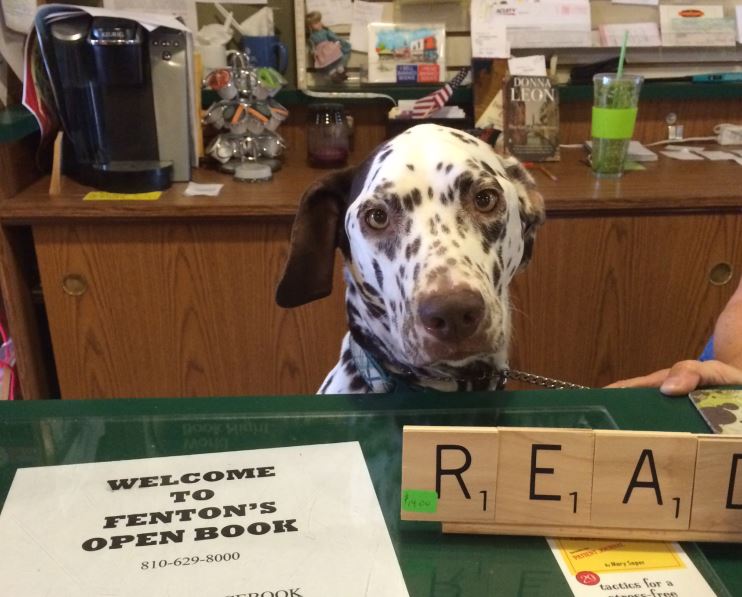 While bookstore cats are wonderful as well as ubiquitous,
While bookstore cats are wonderful as well as ubiquitous, 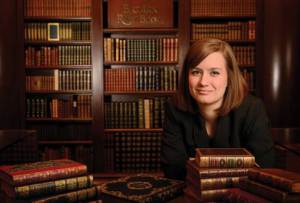 Got any book recommendations?
Got any book recommendations?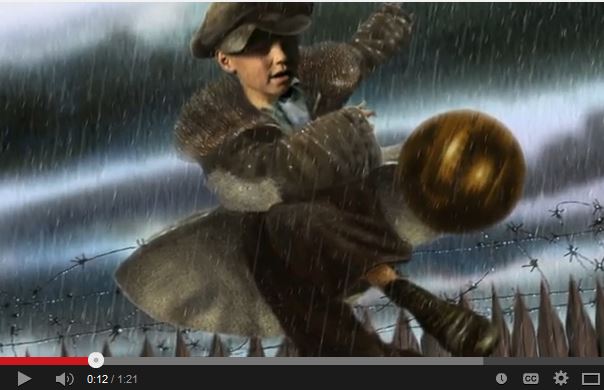 Arcady's Goal
Arcady's Goal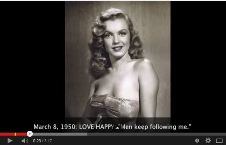 Marilyn Monroe Day by Day: A Timeline of People, Places, and Events
Marilyn Monroe Day by Day: A Timeline of People, Places, and Events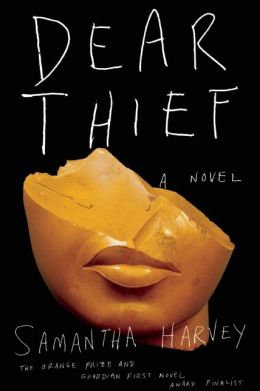 In Dear Thief, Samantha Harvey (The Wilderness) examines the human need for relationships despite the potential for loss. The narrator, who never mentions or signs her name, sits down at her desk in December 2001 to begin a letter she will write, in fits and starts, for half a year. In that six-month span, she pours the pain and poison of her deepest thoughts out onto the page, simultaneously trying to summon and exorcise her treacherous, long-lost best friend Nina, nicknamed Butterfly.
In Dear Thief, Samantha Harvey (The Wilderness) examines the human need for relationships despite the potential for loss. The narrator, who never mentions or signs her name, sits down at her desk in December 2001 to begin a letter she will write, in fits and starts, for half a year. In that six-month span, she pours the pain and poison of her deepest thoughts out onto the page, simultaneously trying to summon and exorcise her treacherous, long-lost best friend Nina, nicknamed Butterfly.